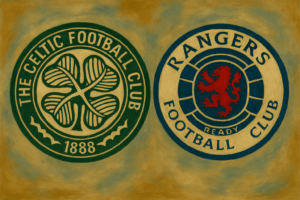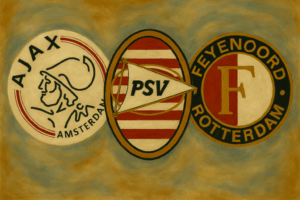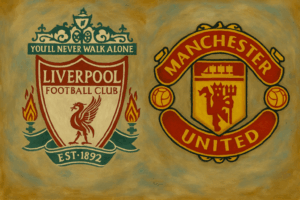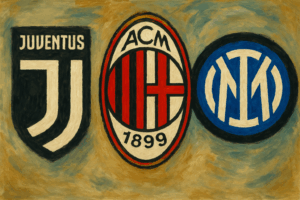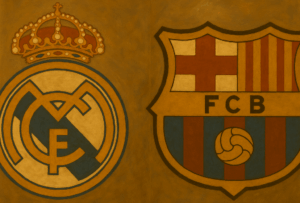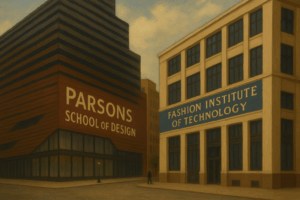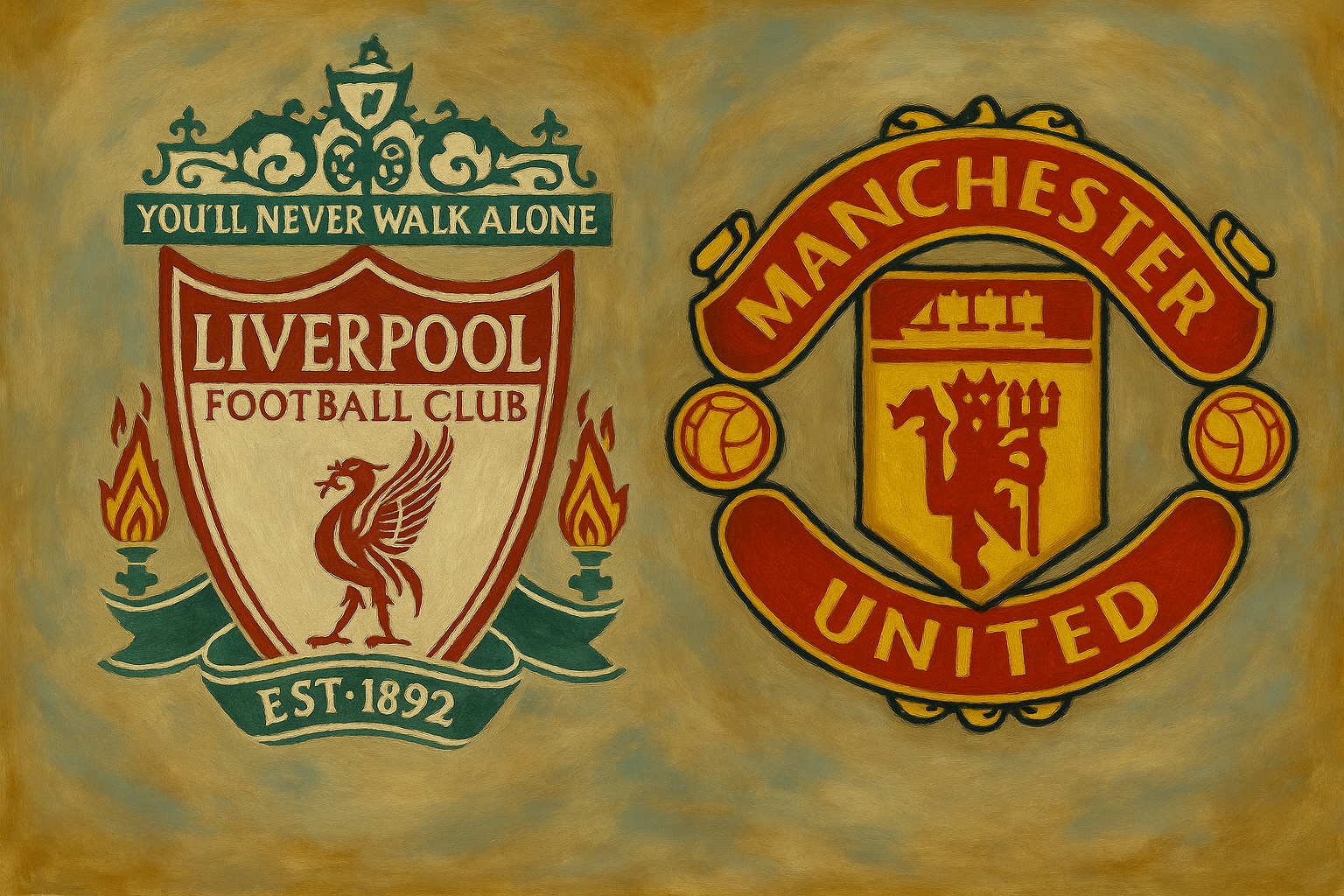
The GOAT of English Football?
In the world of English football, no phrase carries as much weight as the ‘North-West Derby.’ The clash between Liverpool FC and Manchester United transcends a simple football match. It is a battle of pride between the two most successful clubs in English football history, a cultural collision between two cities that share the legacy of the Industrial Revolution, and a fateful stage where the sagas of two giants, marked by glory and tragedy, intersect.
This post, from the perspective of 2025, will delve deep into the historical and cultural foundations that form the basis of this rivalry, moving beyond the temporary form of the clubs. We will shed light on the rivalry between the two cities, the tragedies that forged the souls of the clubs, and the legendary managers and immortal legends who built the ‘Liverpool Way’ and the ‘United Way.’
1. A Tale of Two Cities: The Origins of the Rivalry
The Heart of the Industrial Revolution: The Competition Between Manchester and Liverpool
The rivalry between the two clubs has its roots in the 19th-century Industrial Revolution, long before football existed. At the time, Liverpool, a global port city, and Manchester, the center of the cotton spinning industry, were in an interdependent relationship.
However, this symbiotic relationship was irrevocably fractured by the opening of the Manchester Ship Canal in 1894. The merchants of Manchester constructed a canal that allowed large ships to come directly inland, bypassing the Port of Liverpool. This was Manchester’s declaration of economic independence and a direct challenge to Liverpool’s economic status, planting deep-seated animosity and competitiveness between the two cities.
The Birth of Football Giants
- Manchester United: Started in 1878 as ‘Newton Heath LYR F.C.,’ founded by railway company workers. After starting as a typical working-class team and facing bankruptcy, it was reborn in 1902 under the name ‘Manchester United.’
- Liverpool FC: Anfield, the hallowed ground of Liverpool today, was originally the home of their rivals, Everton. In 1892, after a rent dispute between the stadium owner, John Houlding, and the Everton board, Everton left. Houlding then founded a new team to play in the empty stadium.
2. The Soul of the Clubs, Etched by Tragedy
The Flowers of Munich: The Munich Air Disaster (1958)
On February 6, 1958, a plane carrying the young Manchester United squad known as the ‘Busby Babes’ crashed in Munich. In this disaster, eight players, including Duncan Edwards, lost their lives, and a generation known as the ‘Flowers of Munich’ was tragically lost.
This tragedy transformed Manchester United from a mere football club into an indomitable symbol of rising from tragedy. Ten years later, in 1968, manager Matt Busby led the survivors and new stars to the pinnacle of the European Cup, dedicating the trophy to the memory of their fallen teammates from Munich.
Justice for the 97: The Hillsborough Disaster (1989)
On April 15, 1989, 97 Liverpool fans lost their lives in a crush at Hillsborough Stadium during an FA Cup semi-final. In the aftermath of the disaster, the police and some media outlets attempted to cover up the truth by blaming the fans.
After decades of relentless struggle, led by the ‘Hillsborough Family Support Group,’ a court in 2016 finally acknowledged that the cause of the disaster was police negligence. In this long and arduous process of struggle, the club’s anthem, “You’ll Never Walk Alone,” became more than just a song; it became a symbol of solidarity and hope, commemorating the victims and fighting against unjust authority.
3. The Empire Builders: The Legendary Managers
The Liverpool Way: Shankly, Paisley, and the Boot Room
Manager Bill Shankly, who took over in 1959, laid the foundation for Liverpool’s golden age by instilling a ‘pass and move’ philosophy and creating the ‘Boot Room,’ a space for the collective intelligence of his coaching staff. His successor, Bob Paisley, won six league titles and three European Cups in nine seasons, proving that the ‘Liverpool Way’ was not the work of one genius but the power of a system and continuity.
The United Way: Busby, Ferguson, and the Obsession with Glory
The history of Manchester United is summarized by two great Scottish managers: Matt Busby and Sir Alex Ferguson. If Busby wrote the saga of recovery by rising from the tragedy of Munich to conquer Europe, Ferguson lifted a total of 38 trophies, including 13 Premier League titles and 2 Champions League titles, over 26 years, making the ‘United Way’ synonymous with ‘victory.’
4. The Pantheons: 10 Legends Who Defined the Clubs
Liverpool’s Pantheon
- Kenny Dalglish: ‘King Kenny.’ The eternal king of Liverpool who won six league titles and three European Cups as a player, and a league and FA Cup double as a player-manager.
- Steven Gerrard: A ‘one-club man’ from the Liverpool youth system. A hero who single-handedly carried the team through its dark ages and the captain who created the Miracle of Istanbul in 2005.
- Ian Rush: The club’s all-time leading scorer (346 goals). The goalscorer who put the finishing touches on Liverpool’s dominance in the 1980s.
- Graeme Souness: The midfield general of the 1980s who combined steel-like fighting spirit with elegant technique.
- John Barnes: A pioneer who broke down the barriers of racism with overwhelming skill, and a winger whose play was close to an art form.
- Billy Liddell: The personification of loyalty who single-handedly sustained the team through its dark period after World War II. At the time, Liverpool was often called ‘Liddellpool.’
- Alan Hansen: The epitome of an ‘elegant defender.’ The originator of Liverpool’s ‘ball-playing defender’ tradition.
- Jamie Carragher: The ‘Liverpool spirit’ itself. The icon of dedication who was like a fan wearing the uniform and playing on the pitch.
- Roger Hunt: The spearhead of the Shankly revolution and a key member of England’s 1966 World Cup-winning team.
- Kevin Keegan: The superstar of 1970s English football. Led the club to its first-ever European Cup.
Manchester United’s Pantheon
- Sir Bobby Charlton: A survivor of the Munich disaster and a symbol of the club’s reconstruction. The gentleman of English football who won the 1966 World Cup and the Ballon d’Or.
- George Best: The first ‘football superstar’ and the ‘Fifth Beatle.’ The incarnation of a genius that no one could stop.
- Denis Law: A member of the ‘United Holy Trinity.’ Scotland’s only Ballon d’Or winner.
- Ryan Giggs: Holder of the club’s all-time appearance record (963 matches) and the most Premier League titles (13).
- Paul Scholes: The ‘Quiet Genius.’ A midfielder of the century, acknowledged by Zidane and Xavi.
- Eric Cantona: The ‘catalyst’ who changed the club’s history. The icon of charisma who was revered by fans as ‘King Eric.’
- Roy Keane: The great captain who led the team to the 1999 Treble with his fiery leadership. The personification of a ‘winning mentality.’
- Wayne Rooney: The club’s all-time leading scorer (253 goals). The forward who symbolizes United’s last golden age.
- Peter Schmeichel: ‘The Great Dane.’ A revolutionary who changed the concept of the modern goalkeeper.
- Bryan Robson: ‘Captain Marvel.’ The indomitable warrior who single-handedly led the team during its dark ages.
The Final Whistle: A Comprehensive Comparison and Conclusion
The Trophy Cabinet: A Record of Glory
| Competition | Liverpool | Manchester United |
|---|---|---|
| League Titles (1st Division) | 20 | 20 |
| FA Cup | 8 | 13 |
| League Cup | 10 | 6 |
| European Cup / Champions League | 6 | 3 |
| Total Major Trophies | 69 | 68 |
Conclusion: A Never-Ending Rivalry
If Manchester United started as a team of workers, rose from tragedy, and built an empire of ‘glory’ under an absolute leader in Ferguson, then Liverpool was born from a business dispute and constructed a dynasty of ‘solidarity’ through the collective intelligence system of the ‘Boot Room.’
When one side shouts “Glory, Glory,” celebrating victory, the other side sings “You’ll Never Walk Alone,” embracing pain and moving forward together.
Ultimately, the answer to the question ‘Which club is greater?’ will never be settled. One thing is certain: their rivalry is a grand saga that goes beyond a simple football match, a saga in which the pride of two cities, the history of two clubs, and the lives of countless fans are intertwined. And that saga will continue to be written on the hottest stage of English football.
